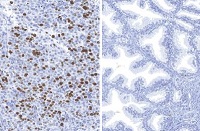 |
| Siah2 levels (brown staining) are high in human castration-resistant prostate cancer (left), as compared to benign prostate growths (right).--Courtesy of Sanford-Burnham Medical Institute |
Researchers at the Sanford-Burnham Medical Research Institute in La Jolla, CA, have discovered a specific protein that helps prostate cancer cells become resistant to hormone therapy, which could provide a new therapeutic window for improved treatment regimens.
For some men, hormone therapy--which halts the production of male testosterone--can help shrink or halt the growth of cancer tumors. But sometimes men can become resistant to hormone therapies, and at this point, their disease is classified as androgen-insensitive or castration-resistant prostate cancer.
A team led by Sanford-Burnham scientists has found a key mechanism that explains why this happens--a protein called Siah2 causes a portion of androgen receptors to be constantly active in these prostate cancer cells. Androgen receptors--sensors that receive and respond to the hormone androgen--play a critical role in prostate cancer development and progression. By inhibiting Siah2's interaction with the androgen receptor complex, scientists might be able to develop alternative treatments for prostate tumors.
"We see Siah2 not only as a biomarker--a way to track the development and progression of castration-resistance--but also as a potential therapeutic target for prostate cancer," lead study author and Sanford-Burham faculty scientist Jianfei Qi said in a statement.
The Sanford-Burnham team collaborated with scientists at Vancouver Prostate Centre at the University of British Columbia to look at human castration-resistant prostate tumors. What they found was that these tumors had abnormally high levels of Siah2 and select androgen receptor targets.
Testing their theory in three different animal models, researchers found that when they inhibited Siah2 in each case, prostate tumors were once again responsive to hormone therapy. The research was published March 18 in the journal Cancer Cell.
- here's the press release
- read the research abstract